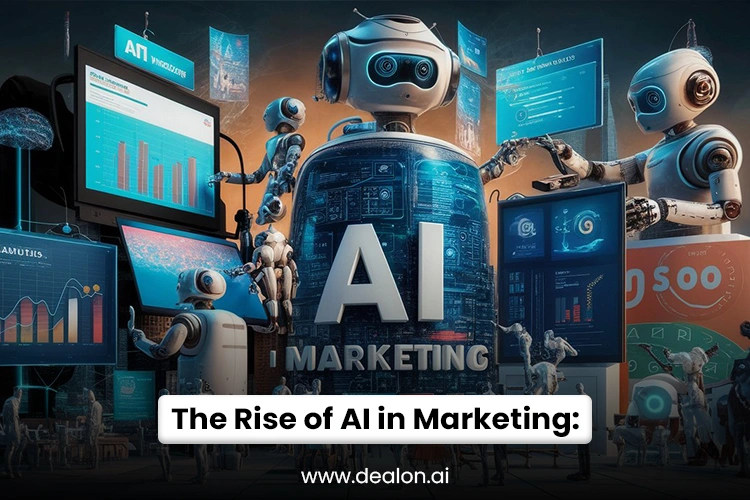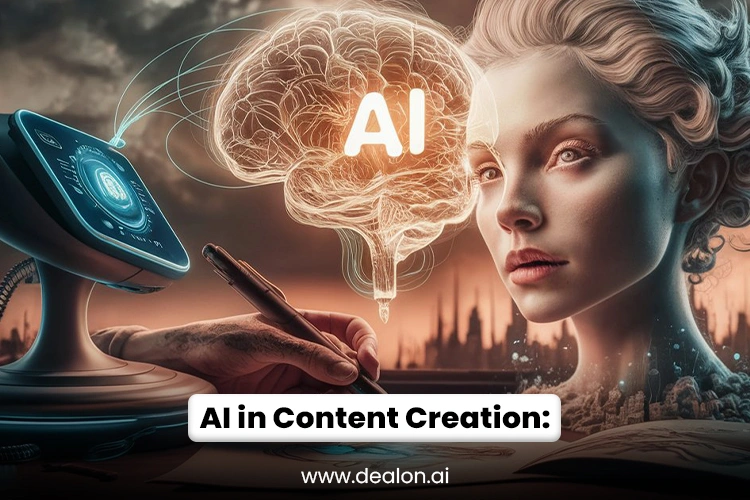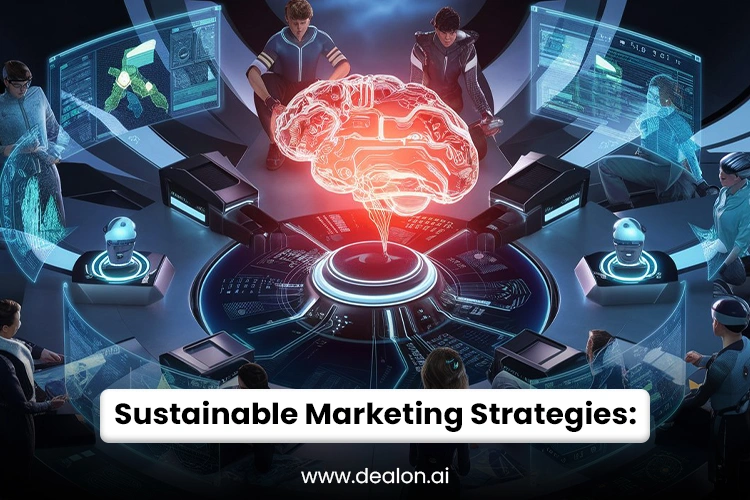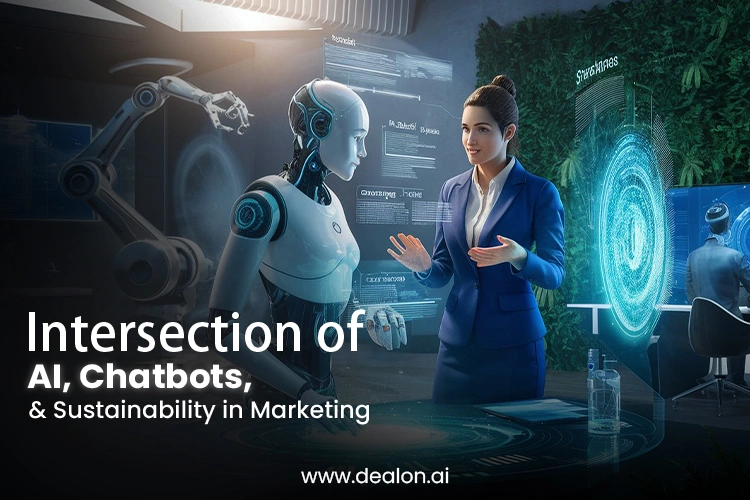In a time where digital transformation is changing industries, the convergence of Artificial Intelligence (AI), chatbots, and sustainability is emerging as a transformative force in marketing. As consumers increasingly prioritize environmental consciousness, brands seize the opportunity to marry technological innovation with eco-friendly practices, crafting marketing strategies that resonate with sustainability values. AI-powered chatbots are at the heart of this evolution, revolutionizing how businesses engage with their audiences while minimizing their environmental footprint.
These intelligent systems enhance customer interaction through personalized experiences and support sustainability by reducing resource consumption, optimizing processes, and fostering transparency in operations. The growing market for sustainable products and practices pushes brands to rethink traditional marketing approaches, shifting from profit-driven goals to a holistic focus on corporate responsibility.
Integrating AI and chatbots into sustainability-driven campaigns marks the dawn of a new era in marketing—one where technology drives both innovation and ethical impact. As businesses navigate this intersection, they set a new standard for being socially and environmentally responsible in the digital age, ensuring that marketing strategies are practical and aligned with a greener, more sustainable future.
Also Read: 6 Trends in AI-Driven Visual Search Changing E-commerce
The Rise of AI in Marketing: A Sustainable Shift

AI is rapidly becoming the heart of modern marketing strategies, transforming how businesses engage with consumers and approach operational efficiency. The promise of AI extends far beyond automation and personalization; it is now increasingly recognized as a powerful tool for driving sustainability within marketing practices. As environmental concerns continue to rise, brands discover that AI can play a central role in minimizing their ecological impact while enhancing customer satisfaction and boosting profitability.
AI’s ability to analyze extensive datasets has long been its greatest strength in marketing. From predicting consumer behavior to automating content creation, AI enables businesses to offer highly personalized, relevant experiences at scale. These capabilities, however, are only part of the equation. The true potential of AI in sustainable marketing lies in its capacity to optimize resource usage, reduce waste, and streamline supply chains—creating a more eco-conscious approach to marketing.
Optimizing Resource Allocation and Reducing Waste
A significant aspect of AI’s sustainability impact is its ability to accurately predict trends and forecast consumer demand. Traditional marketing often produces overproduction or excess inventory, contributing to waste and carbon emissions from unsold goods. However, with AI-driven insights, brands can align production and marketing efforts more closely with consumer preferences. AI-powered tools can analyze past behavior, social trends, and external factors to predict what products resonate most with target audiences. This leads to better decision-making, reducing the risk of overproduction and the need for mass discounting, often resulting in discarded unsold goods.
For example, in advertising, AI can dynamically allocate budget and optimize digital ad placements to ensure that resources are used most efficiently financially and environmentally. By focusing on the most relevant, high-impact channels and eliminating wasteful spending on underperforming ads, AI can reduce energy consumption associated with digital advertising infrastructures and the carbon footprint generated by unneeded digital impressions.
Reducing Carbon Footprint Through Smarter Supply Chains
AI is also vital in transforming the supply chain into a more sustainable system. In marketing, the ability to optimize product distribution and logistics can have a substantial impact on reducing carbon emissions. AI can streamline supply chain processes through predictive analytics by accurately forecasting demand at various locations, allowing businesses to minimize unnecessary transportation and inventory storage. AI-driven supply chain management systems can ensure that products are only produced and distributed when and where they are needed, reducing the environmental impact of transportation and warehousing.
Moreover, by leveraging AI to optimize routes for transportation, businesses can reduce fuel consumption and the carbon footprint of logistics operations. Machine learning algorithms can process extensive data such as weather conditions, traffic patterns, and historical shipping routes to identify the most fuel-efficient paths, significantly reducing emissions associated with product delivery. This approach enhances operational efficiency and contributes to a greener planet by reducing unnecessary energy use.
AI-Powered Personalization with a Sustainable Focus
Beyond supply chain management and resource optimization, AI is also helping brands create personalized marketing campaigns that prioritize sustainability. Today’s Consumers are more discerning than ever. AI can enable businesses to deliver personalized, sustainability-focused recommendations that resonate with eco-conscious consumers. By analyzing consumer preferences and purchase history, AI can suggest eco-friendly products, offer information on the brand’s sustainability efforts, and even provide tips for minimizing their environmental impact.
Additionally, AI allows marketers to craft tailored messaging that speaks directly to a consumer’s values, developing better connections between the brand and its audience. For example, if a customer buys products made from sustainable materials, AI can highlight new arrivals in this category or notify them of promotions related to green initiatives. This personalized approach fosters loyalty and reinforces the brand’s commitment to sustainable practices.
AI in Content Creation: Reducing Resource Use

Another compelling way that AI is revolutionizing marketing sustainability is through its role in content creation. Traditional content production—for advertisements, blogs, or social media—can be resource-intensive, requiring large teams and considerable time. AI can streamline content creation by automating writing, image generation, and video editing processes, reducing the time and labor needed for production. This improves efficiency and lowers the carbon footprint of producing vast content.
For example, AI tools like natural language processing (NLP) can generate written content based on specific keywords and guidelines, minimizing the need for human writers to create repetitive articles or posts. Similarly, AI-powered design platforms can create visual content at scale, drastically reducing the number of human designers needed. These efficiencies benefit businesses in terms of cost savings and speed and contribute to reducing the environmental costs associated with content creation.
Chatbots: The Green Ambassadors of Customer Service
As businesses strive to decrease their environmental footprint, AI-powered chatbots are emerging as pivotal tools in transforming customer service into a more sustainable operation. These AI-driven assistants redefine how brands interact with customers by automating processes that traditionally require human intervention. Not only do chatbots provide enhanced customer service, but they also serve as the green ambassadors of the digital world, driving both efficiency and eco-consciousness within marketing strategies.
Reducing Carbon Footprint with Automation
Chatbots’ most significant environmental benefit lies in their ability to automate customer interactions, thereby decreasing the need for human resources. In traditional customer service models, businesses rely on large teams of employees, often requiring office space, energy for daily operations, and resources for maintaining call centers. These operations result in significant energy consumption, travel emissions, and office waste. Chatbots, however, eliminate the need for physical office spaces and reduce the amount of human labor required for mundane tasks. Businesses can minimize their carbon footprint by shifting customer service functions to virtual assistants while offering immediate, practical support.
Additionally, chatbots are accessible 24/7, meaning that customers can get help anytime without the business needing to maintain round-the-clock operations. This availability reduces the need for multiple shifts or additional personnel, decreasing energy consumption and optimizing resource use. These systems operate on cloud-based platforms that are inherently more energy-efficient than traditional office setups, significantly reducing overall energy usage.
Streamlining Operations for Greater Efficiency
Beyond reducing physical space requirements and labor, chatbots contribute to operational efficiency, a crucial factor in sustainability. By leveraging AI algorithms, chatbots streamline workflows by offering quick resolutions to customer queries, significantly reducing response times and the resources required to handle each interaction. This heightened efficiency allows businesses to process more requests without expanding their teams or resources, enabling them to deliver high-quality service while conserving energy and materials.
The AI capabilities of chatbots enable them to handle complex customer inquiries that traditionally require human intervention, reducing the need for lengthy phone calls or face-to-face interactions that consume additional resources. Through NLP and machine learning, chatbots are becoming increasingly adept at understanding context, making conversations more efficient and less energy-intensive. They also eliminate the environmental costs of traditional paper-based systems as businesses move towards fully digital customer service solutions.
Personalization with Minimal Environmental Impact
Chatbots not only provide a greener alternative to traditional customer service, but they also enhance personalization, a cornerstone of effective marketing. Chatbots can offer tailored recommendations by analyzing customer data and guiding customers through their purchasing journey based on previous interactions, preferences, and behaviors. This AI-powered personalization creates a more engaging and satisfying customer experience while minimizing the need for large-scale advertising or excessive promotions, often leading to wasteful resource allocation and carbon emissions.
In addition to personalized product recommendations, chatbots can educate customers on sustainability initiatives, offer eco-friendly alternatives, or highlight a brand’s environmental efforts. By incorporating these messages into customer interactions, chatbots help brands strengthen their sustainability ethos while encouraging consumers to make environmentally conscious choices. This makes chatbots an operational asset and a powerful tool for promoting greener, more sustainable purchasing behaviors.
Minimizing Travel and Emissions
The environmental impact of customer service can be further reduced by eliminating the need for customer visits to physical stores or service centers. In industries like retail and travel, customers often rely on face-to-face consultations or phone calls to resolve queries, which requires them to travel to various locations. Chatbots provide a digital platform where customers can get immediate assistance without traveling, reducing transportation emissions. This shift from physical to digital interactions is a step toward more sustainable consumer habits and a cleaner environment.
Chatbots also decrease the carbon footprint associated with business travel by offering virtual customer support. Employees, especially in customer service and marketing roles, no longer need to travel for on-site meetings or to manage customer queries in different locations. This further reduces carbon emissions linked to business-related transportation, significantly contributing to environmental pollution.
Driving Customer Engagement with Sustainability in Mind
Another innovative aspect of chatbot-driven sustainability lies in how these systems engage customers with sustainability-related content. Brands can use AI-powered chatbots to send proactive reminders about recycling, energy-saving tips, and updates on eco-friendly products. By automating such content distribution, chatbots help to create a continuous conversation around sustainability, inspiring customers to adopt more sustainable lifestyles without requiring additional manual effort from the brand.
Chatbots can also be programmed to provide real-time sustainability metrics, such as customers’ carbon savings, by choosing eco-friendly products or opting for digital over paper-based communications. This level of engagement supports the customer’s commitment to a greener lifestyle and reinforces the brand’s image as a responsible, eco-conscious entity.
Sustainable Marketing Strategies Enhanced by AI and Chatbots

Integrating Artificial Intelligence (AI) and chatbots into marketing strategies represents a significant leap forward for brands aiming to embrace sustainability. Consumers make more mindful choices as environmental consciousness grows, favoring brands that reflect their values. At the intersection of AI, chatbots, and sustainability, businesses are unlocking new possibilities for driving eco-conscious behavior, delivering personalized messaging, and optimizing marketing operations. This convergence transforms how brands communicate their sustainability initiatives to customers beyond simple operational efficiencies.
AI-driven chatbots are revolutionizing how brands offer product recommendations by leveraging advanced data analytics to align suggestions with a consumer’s sustainability preferences. By analyzing purchase histories, browsing habits, and individual values, these chatbots can suggest products that adhere to eco-friendly standards, such as renewable energy usage, sustainable sourcing, or carbon-neutral shipping. This personalized approach enhances customer satisfaction by providing relevant options and reinforces the brand’s commitment to sustainability.
For instance, a chatbot can recommend a product that utilizes biodegradable packaging or is produced with minimal environmental impact. The recommendation engine taps into an extensive database of green-certified products, ensuring that every choice provided to the customer contributes to a more sustainable future. This creates an ecosystem of purchasing that actively promotes greener choices while subtly educating consumers on the environmental implications of their decisions. This strategic use of AI to drive eco-friendly behavior strengthens the bond between the customer and the brand, transforming shopping from a transactional experience to a shared journey toward sustainability.
Personalization in marketing has long been heralded as a means to improve customer engagement, and with AI, this concept reaches new heights when combined with sustainability messaging. Powered by sophisticated AI algorithms, Chatbots can engage in meaningful conversations with consumers, tailoring messages that resonate with individual preferences and values. This personal touch lets brands inform customers of their purchasing decisions, helping them make better choices that align with their sustainability goals.
AI can craft highly targeted sustainability messages by examining past purchases, demographic information, and state environmental values. Chatbots can present users with more eco-friendly alternatives, highlight the brand’s environmental initiatives, and even offer incentives for adopting sustainable practices, such as discounts for reusable packaging or rewards for carbon-neutral shipping options. These personalized interactions don’t just build brand loyalty—they also foster a sense of responsibility in the consumer, motivating them to act in favor of the planet.
The effectiveness of this messaging is amplified by AI’s capacity to continuously understand and adapt based on user interactions, ensuring that every communication feels authentic and relevant. This level of customization is crucial for brands that want to stay ahead in a marketplace where consumer expectations regarding sustainability are on the rise.
AI’s capability to analyze vast amounts of consumer data offers invaluable insights that can guide a brand’s sustainability strategy. By determining trends and patterns in consumer preferences, AI helps marketers tailor their campaigns to meet the increasing market for green products. AI tools can dissect customer behavior, pinpoint the eco-friendly products or services that generate the most interest, and reveal the best channels for communicating sustainability messages.
For example, AI might uncover that a significant portion of a company’s customer base prefers products with minimal packaging or is particularly interested in items made from recycled materials. With these insights, brands can refine their marketing campaigns to promote the most relevant sustainability features, ensuring their messaging aligns with consumer desires. This data-driven approach shifts sustainability from a superficial marketing trend to an integral part of the customer experience. Marketers can develop more authentic campaigns that resonate with eco-conscious consumers, positioning the brand as a leader in the sustainability space.
The Future of Marketing: AI, Chatbots, and Sustainability
As the world moves toward greater environmental consciousness, the intersection of Artificial Intelligence (AI), chatbots, and sustainability is poised to redefine the future of marketing. Businesses face increasing pressure to meet sustainability goals, reduce carbon footprints, and demonstrate their commitment to eco-conscious practices. In this shift, AI and chatbots will be crucial in guiding brands to adapt and succeed in the changing sustainability landscape.
In the coming years, AI and chatbots will become more intuitive and capable of accurately anticipating consumer needs. Deep learning algorithms and enhanced data analytics allow AI to analyze vast consumer data to predict trends, personalize marketing content, and perfectly fine-tune messaging strategies. This hyper-personalization will empower businesses to engage customers meaningfully, highlighting sustainable choices that align with their values.
For example, AI-driven chatbots will go beyond offering product recommendations—they will be able to guide customers through the entire buying process, offering eco-friendly alternatives and suggesting greener delivery options. With such proactive, environmentally-conscious engagement, businesses can ensure that their marketing efforts contribute directly to reducing waste, optimizing resource use, and minimizing the environmental impact of their operations.
Moreover, as AI evolves, its capacity to streamline sustainability reporting and track real-time environmental data will become increasingly important. This data-driven transparency will allow businesses to showcase their sustainability achievements, gaining consumer trust and loyalty. By aligning marketing strategies with eco-conscious values, companies will fulfill consumer expectations and play an integral role in fostering a more sustainable world.
Conclusion
The convergence of AI, chatbots, and sustainability in marketing represents a decisive shift in how businesses approach customer engagement and environmental responsibility. As consumer demand for eco-conscious practices grows, brands increasingly leverage AI and chatbots to deliver personalized, sustainable marketing experiences. From eco-friendly product recommendations to data-driven decision-making, these technologies enable brands to align their operations with green initiatives while optimizing customer interactions.
AI’s ability to predict consumer preferences and streamline marketing efforts allows businesses to reduce waste, minimize their carbon footprint, and make smarter decisions. Chatbots, with their ability to offer round-the-clock, personalized support, are crucial in transforming customer service into a more sustainable function, eliminating the need for energy-intensive operations.
Looking ahead, integrating AI and chatbots into sustainable marketing strategies will continue to evolve, helping businesses meet the increasing pressure for eco-conscious practices while staying competitive. As these technologies become even more advanced, they will drive innovative solutions that enhance consumer satisfaction and contribute to a more sustainable future.

